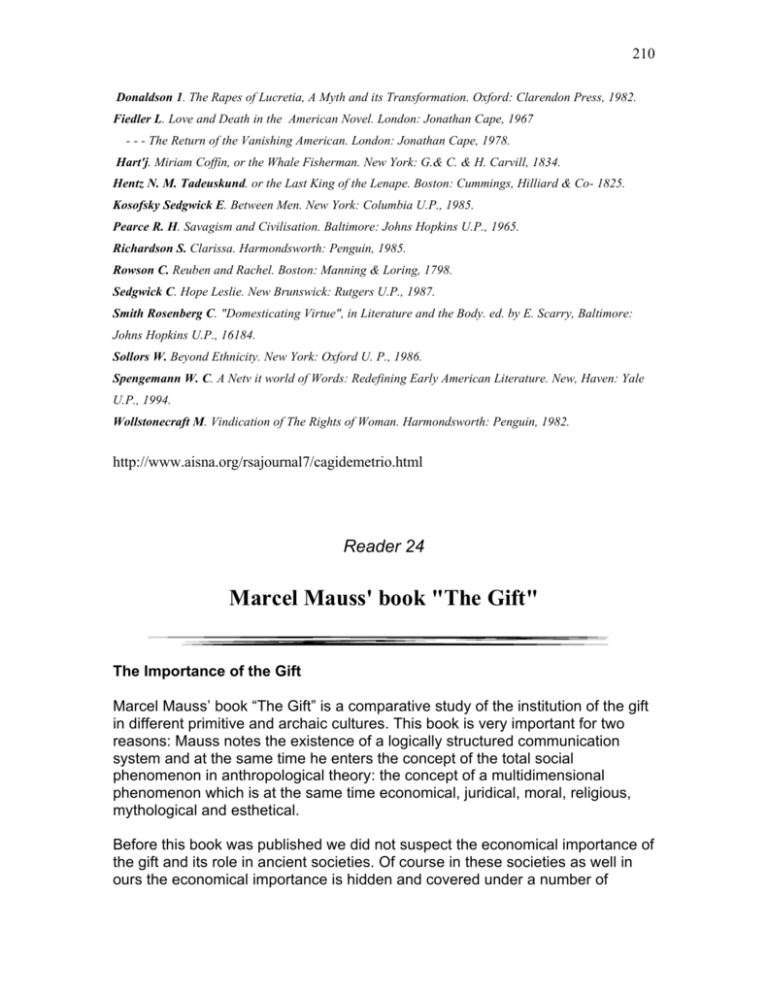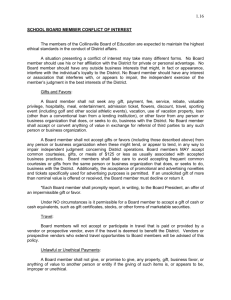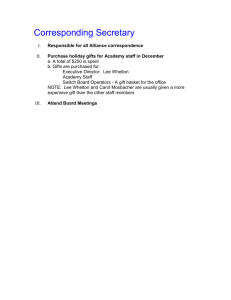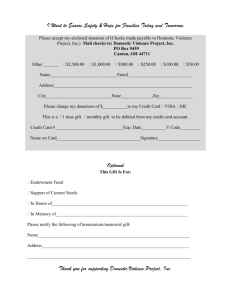Marcel Mauss' book "The Gift"
advertisement

210 Donaldson 1. The Rapes of Lucretia, A Myth and its Transformation. Oxford: Clarendon Press, 1982. Fiedler L. Love and Death in the American Novel. London: Jonathan Cape, 1967 - - - The Return of the Vanishing American. London: Jonathan Cape, 1978. Hart'j. Miriam Coffin, or the Whale Fisherman. New York: G.& C. & H. Carvill, 1834. Hentz N. M. Tadeuskund. or the Last King of the Lenape. Boston: Cummings, Hilliard & Co- 1825. Kosofsky Sedgwick E. Between Men. New York: Columbia U.P., 1985. Pearce R. H. Savagism and Civilisation. Baltimore: Johns Hopkins U.P., 1965. Richardson S. Clarissa. Harmondsworth: Penguin, 1985. Rowson C. Reuben and Rachel. Boston: Manning & Loring, 1798. Sedgwick C. Hope Leslie. New Brunswick: Rutgers U.P., 1987. Smith Rosenberg C. "Domesticating Virtue", in Literature and the Body. ed. by E. Scarry, Baltimore: Johns Hopkins U.P., 16184. Sollors W. Beyond Ethnicity. New York: Oxford U. P., 1986. Spengemann W. C. A Netv it world of Words: Redefining Early American Literature. New, Haven: Yale U.P., 1994. Wollstonecraft M. Vindication of The Rights of Woman. Harmondsworth: Penguin, 1982. http://www.aisna.org/rsajournal7/cagidemetrio.html Reader 24 Marcel Mauss' book "The Gift" The Importance of the Gift Marcel Mauss’ book “The Gift” is a comparative study of the institution of the gift in different primitive and archaic cultures. This book is very important for two reasons: Mauss notes the existence of a logically structured communication system and at the same time he enters the concept of the total social phenomenon in anthropological theory: the concept of a multidimensional phenomenon which is at the same time economical, juridical, moral, religious, mythological and esthetical. Before this book was published we did not suspect the economical importance of the gift and its role in ancient societies. Of course in these societies as well in ours the economical importance is hidden and covered under a number of 211 symbolisms. Even today, we can notice this function of the gift, for example when a young couple gets married. Indeed in our society survive a lot of aspects of the gift; they are only adapted to the new situation and they do not play a central role. This role is now played by the free market and this the result of the social evolution from the stage of exchange to the stage of the free market. THE BOOK The book is divided in four chapters with the following subjects: i. The exchange of gifts and the obligation to reciprocate ii. The extension of this system iii. Survivals of these principles in ancient systems of law and ancient economies iv. Conclusion What Mauss is trying to show is that in all societies gifts which are supposed to be given voluntarily, are actually obligatory. He argues that all social phenomena are connected with each other, therefore they are total, and all kinds of institutions are expressed through them. The gift is only one part of this social whole. In archaic societies, a gift must be paid back, otherwise this whole is broken. The question that Mauss puts at the beginning and the one he tries to answer throughout the book is: According to which legal principle in archaic societies must the gift be obligatory reciprocated? Which power exists in the gift and makes its recipient pay it back? The method he uses is the comparative and the regions on which he concentrates are: Polynesia, Melanesia, and North West America. Before he begins his comparative study, he summarizes some of the conclusions of a greater study that he did with Davy. He argues that there has never existed the stage that we call natural economy. In the earlier western legal and economical systems, the exchange of goods took place between collectivities and not individuals. These exchanges were not only exchanges of goods and wealth but mostly of banquets, rituals, military services, women, children, dances, festivals and fairs. In this system the economical transaction does not play the central role but is mere an aspect of the greater and enduring contract. The most important point is that these givings which are given as gifts, are obligatory and enclose the danger of war, private or public. Mauss calls this system a system of total services. It means that each gift is part of a system of reciprocity in which the honor of giver and recipient are engaged. The best example of this phenomenon is the alliance between two phratries in North America which are connected with a complicated exchange system. Mauss suggests to call this phenomenon potlatch like his American colleagues. The word comes from the Tsinuk and it actually means: feed, consume. What is noteworthy in these tribes is the principle of rivalry and hostility that prevails in all 212 these practices. There is also a very strict hierarchy and the whole tribe or clan is identified, for all that it possesses and all that it does, through the person of its chief. Mauss defines the term potlatch as: total services of an agonistic type. Chapter one In this chapter Mauss refers to the exchange of gifts in various tribes of Polynesia. Even though potlatch is not to be found there in its entirety, there are a lot of elements of it found. In Samoa gifts accompany the events of marriage, birth, circumcision, sickness, a daughter’s arrival at puberty, funeral rites, trade. The essential elements are those of honor, prestige and mana conferred by wealth. Gifts should be reciprocated if one does not want to lose that mana, the authority and source of wealth. There are two terms used in Polynesia: tonga is used for the items of fixed property, immovable because of their destination. They are things inherited by the daughter of a family when she gets married, with an obligation to be returned. The oloa are movable goods which belong specifically to the husband. From Turner’s translation, oloa = foreign, tonga = native, is derived that certain goods that are termed tonga are more closely linked to the soil, the clan, the family, and the person than certain others that are termed oloa. The above is valid for the Maori law and religion. There is a Maori proverb in which the tonga are implored to destroy the individual who has accepted them. Here is introduced the term hau; the tonga and all goods termed strictly personal possesses a hau, a spiritual power. This imposes the obligation of returning the present, the fact that it possesses something of the giver. This hau follows everyone who possesses the thing and it wishes to return to its birthplace and owner. Thus, the legal tie occurring through things, is one between souls, because a thing itself possesses a soul. Consequently to make a gift of something to someone is to make a present of some part of oneself. That’s why one has to return to another person what is really part and parcel of his nature and substance, because to accept something from somebody is to accept some part of his spiritual essence. Therefore all things that are exchanged exert a magical or religious hold over the recipient. The obligation to give and to receive are very important. To refuse to give or to receive, is to reject the bond of alliance and commonality. It is like the recipient has some kind of right of property over everything that belongs to the donor and this ownership is conceived as a spiritual bond. All things are there for passing on and for balancing accounts. Another important point is that of the gifts to the gods. Indeed, through sacrifice is expressed an analogous situation: people offer to the spirits and gods in exchange to something else. It is believed that they are the owners of the things 213 and possessions of this world. Thus sacrifice is a way to reciprocate for what we make use of. According to Van Ossenbruggen, gifts to humans and to gods also serve the purpose of buying peace between them both. This way evil spirits (and influences) are get rid of. In the more recent times the phenomenon of alms has replaced destruction by sacrifice. The gifts to the children and the poor for example are pleasing to the dead. The ancient morality of gift is that generosity is an obligation of the rich; this way they get rid of the superabundance of happiness and wealth and it is the wish of the gods that this is to be given to the poor. Chapter two In this chapter are examined elements of the potlatch in Melanesia and finally the complete form of potlatch as found in the American Northwest. In the Andaman Islands we find the same principle of intermingling of things with souls. There is also a rivalry among people who try to outdo one another in generosity. In New Caledonia there is a system called pilou-pilou which is a system of festivals, gifts and services resembling potlatch. It is like a legal tie which makes things return. In the Trombriand Islands exists a complicated system called kula which was first described by Malinowski. Kula means circle, a fact which indicates that all things are caught up in a circle, following around this circle a regular movement in time and space. Kula trade is of a noble kind and it seems to be reserved for the chiefs. It is also carried out in a noble, disinterested and modest way. The most complete form of kula is that of sea expeditions. It is a rule to leave without taking anything to give; when they arrive at a place they pretend to receive (they refuse even to ask for food). Next year the tribe is visited by the tribe who gave and they reciprocate what they received with interest. The act of giving itself assumes very solemn forms. One receives something only after it has been cast at his feet; the thing is mistrusted by the recipient and the giver himself affects an exaggerated modesty. The things exchanged this way are the vaygu’a, a kind of money. They are divided into mwali and soulava. The former are beautiful bracelets worn on great occasions, while the latter are necklaces made from red spondylus. They are solemnly worn by women and exceptionally by men. The fortune of Trombriand people comes mainly from the making of these jewelry. As Malinowski notes, these vaygu’a follow a kind of circular movement: the mwali, are passed on regularly from west to east, whereas the soulava always travel from east to west. Their circulation is constant and one should not keep them for a long time; they are also to be passed on to certain partners. 214 This institution has also a mythical, religious and magical aspect. Each vaygu’a owns a name, a personality and history which makes it significant. Certain individuals even take their name from them. We cannot deny their sacred and eminent nature; to possess one is exhilarating, strengthening and calming in itself. There is also a symbolic expression of the marriage of the mwali (feminine symbols), with the soulava (masculine symbols), which stretch out towards each other, as does male towards female. Again we see the expression of things, values, contracts and men. Mauss refers to some more terms: vaga is the opening gift. Yotile is the clinching gift, the one that seals the transaction. It is also called kudu, the tooth that bites; it means that it is obligatory, it is expected and it must be equivalent to the first gift. Basi, which merely pierces the skin, is a kind of advance present, not equivalent to the gift received and is given in order to delay, when one is not able to reciprocate. Kula is only a part of the whole picture and it merely gives expression to many other institutions, bringing them together. All kula provide the occasion for gimwali which are commonplace exchanges, not necessarily between partners. A free market exists between individuals of allied tribes, side by side with closer associations. Between partners there pass, additional gifts, as well as obligatory transactions. Each of these presents bears a special name and the acceptance of one of them has each time another meaning. Gifts are also used in order to attract partners; in this case the motives of this action can be competition, rivalry, ostentatiousness, the seeking after the grandiose and the stimulation of interest. The intertribal kula has a very important role: that of taking the tribe out of its narrow sphere of its physical boundaries, and even of its interests and rights. Such relationships also exist within the tribes and clans. The vaygu’a are not only exchanged between chiefs but also come to chiefs as gifts from relatives of a lower rank. In other words there is a constant give and take, a continuous flow in all directions. Another analogous relationship is that of wasi: it establishes regular acts of exchange, which are obligatory, between, on the one hand, agricultural tribes, and on the other hand, coastal tribes. The sagali, are distributions of food on a grand scale, which are made to groups that have performed some service for the chief or his clan. There are also the pokala and kaributu which are solicitory gifts offered to the gods and the spirits. They are close to what we call remuneration, and they are marks of gratitude and hospitable welcome and must be reciprocated. Also the services rendered to the wife by her husband are considered as a remuneration gift for the sexual services rendered by the wife. In the American Northwest we find the same institutions, although more radical and more marked. Mauss describes these societies and their way of life, something that we will not do here. Potlatch is the system of gifts exchanged and its main characteristics are violence, exaggeration and antagonisms that it 215 arouses and a certain lack of juridical concepts and a simpler and cruder structure. Also the collective nature of the contract is more apparent than in Melanesia and Polynesia. In addition, two new notions are introduced: the notion of credit, of the time limit placed on it, and the notion of honor. It is the nature of the gift to impose an obligatory time limit. In contrast to the sales for cash practiced in our societies, the gift is a more complex phenomenon, which entails the notion of credit. No less important is the notion of honor. Consumption and destruction of goods is a common practice among these peoples. There is a struggle of wealth taking place with the parties competing to see who is the richest and most extravagant. This act of destroying does not give the slightest hint of desiring your gift to be reciprocated. This kind of behavior is noble and replete with etiquette and generosity. We might say that honor and prestige is a substitute for magic. Indeed, the notion of honor exists even in the most primitive of peoples and the potlatch consists of considering the mutual services rendered as acts of honor. Potlatch is what Mauss calls a total phenomenon. It is religious, mythological, and shamanic, juridical, economical and a phenomenon of social structure ( it brings together tribes, clans, families etc.). There are three obligations which make up the essence of potlatch: the obligation to give, to receive and to reciprocate. The consequences of not giving are great; a chief who does not give loses his prestige which consequently means loss of his soul. The same can also be said for the obligation to invite. One has no right to refuse a gift or attend a potlatch. This would mean that he is afraid of having to reciprocate, that he admits himself beaten in advance or in some cases, to proclaim himself the victor and invincible. But when one accepts a gift, this means that he also accepts a challenge and he has to reciprocate, to prove he is not unequal. To refrain from giving, just as to refrain from accepting, is not to lose rank-as is refraining from reciprocating. Normally the potlatch must be reciprocated with interest with rate which ranges from 30-100 per cent a year. One loses face for ever if he does not carry out destruction of equal value. The punishment for failure to reciprocate is slavery for debt. Like in Polynesia, Mauss argues that in the things exchanged during the potlatch, a power is present that forces gifts to be passed around, to be given and returned. All these things are always spiritual in origin and of a spiritual nature. They have even personified property, which for the Haida is the mother, the originating goddess of the dominant phratry. In addition each one of these things possesses productive power itself. It is a sign and pledge of wealth, the magical and religious symbol of rank and plenty. Especially copper objects are regarded as living. They have their own name, individuality and value. They also have a power of attraction between them. Again, we have to underline the importance of the continuous giving and taking. 216 When someone gives and returns things, he is actually giving and returning respects or courtesies. By giving, he is giving himself and that is because he owes himself. At the end of this chapter Mauss comes to a first conclusion: this form of exchange has preceded the purely individual contract of the market, where money circulates and the notion of price reckoned in coinage weighed and stamped with its value, reigns. Chapter three In this chapter Mauss refers to examples of the above principles surviving in ancient societies like the Roman, Hindu, German and Chinese. In ancient Roman law we find the term nexum which refers to pledges. The things pledged are normally without value that are themselves animate. The contracting parties are bound by them. We can also say that the nexum was related to magic and things themselves had a personality and inherent power. Due to this power are the actions and obligations referring to theft. The Romans and Greeks were the ones who distinguished between personal and real law, separated sale from the gift and exchange. They went beyond all the outmoded morality and this economy of the gift, as it was incompatible with the development of the market, commerce and production; it was simply antieconomic. In the classical Hindu law we find the law of the gift, which refers to the Brahmins, to the way they solicit and receive a gift and also to the way a gift is their due. Before the Aryan colonization India was a land of potlatch but later what remained was this law in favor of the Brahmins: presents are obligatory, things have special powers and form part of human persons. The most important belief is that the thing given produces its rewards in this life and the next. This is especially true for the land. All things are also personified and seek to be given away. As for food, it is its nature to be shared out, otherwise its essence is killed. The property of the Brahmin is the Brahmin himself and it becomes poison when it is stolen. Like in the societies described above, the Brahmin refuses the gift at first, out of an invincible sense of pride. This is rather contradictory if we thing that the caste of Brahmins lives entirely on gifts. But the Brahmin must not accept gifts from the king, because so he would put himself in a position of dependence on him, as the relationship between donor and recipient is one of dependence. In the Germanic law we find also the form of the gift and the alliance, by pledges and hostages, by feasts and presents. For a long time it was the only way people communicated, helped and allied themselves to one another. Mauss notes the great number of words deriving from geben and gaben in the German language. There are two institutions related to the subject: the Gaben (gifts) and the pledge. 217 The pledge is compulsory, has little value and is returned when payment for the thing handed over has been made. The pledge binds also the honor, authority and mana of the one who hands it over. The latter remains in a position of inferiority so long as he is not freed from his pledge–wager. The receiver also binds himself and he receives the thing after it has been thrown at his feet. Therefore the pledge, holds danger for both parties. In the Chinese law we find an interesting element: when someone sells a thing he preserves the right to weep for his property. This is based on the idea that the contracting parties are deemed to be in a state of perpetual dependence towards one another. Conclusion In this part of the book Mauss extends the above observations to our societies. On the moral level he is rather optimistic and pleased to find that not everything is wholly categorized in terms of buying and selling. He recognizes traces of the principles of the gift in the case of invitations and courtesies which must be returned and in our tendency to give back more than we have received. Things have still, in a way, soul; they are still followed by their former owner and much more by their producer. That is especially true for the works of art. We also find traces of this in the social insurance legislation. Mauss sees it as a way to reciprocate what the worker has given to the collectivity and his employers. Of course we cannot help noting here that this point of view is rather naive. He also believes that we return to a group morality, an example of which is the mutual benefit societies which finance charitable works. On the other hand society is looking after the individual through charity, social service and solidarity. He suggests that we should return to archaic society and to elements in it like: the joy of public giving, the pleasure of generous expenditure on the arts, in hospitality and in the private and public festival. The rich must come back to considering themselves-freely and also by obligation-as the financial guardians of their fellow citizens. He wants to see society moving to the kind of system of total services. Regarding the economic facts, Mauss tries to apply some of the principles of the gift to our society. In archaic societies there is a notion of value; the only difference is, their economies are still filled with religious elements. Money still possesses its magical power and is linked to the clan or the individual. All economic activities retain a ceremonial character that is obligatory and effective. These societies are far from being ruled by utilitarianism and materialism. Of course they are not totally disinterested but they do not understand interest in the way that we do. Malinowski classified all transactions among the Trombriand islanders, from the 218 point of view of motives of self-interest and disinterestedness. He suggested that the only pure gift is that between man and wife. But in this point he did not think that these gifts are a kind of payment to the wife for sexual services rendered. Therefore all gifts had some kind of interest hidden behind them. Even acts of pure destruction are not without egoism, because through such acts a hierarchy is established as one shows superiority. In these societies wealth is more a mean of retaining prestige as something useful. Also the notion of interest is a matter of political self-interest. Mauss states happily that we have not yet become entirely economic animals and that we are still guided by principles like irrational expenditure. Finally he analyses the term of total social facts, meaning that they involve the totality of society and its institutions. These phenomena are at the same time juridical, economic, religious and even esthetic and morphological. But above all these institutions are whole entities, entire social systems, which he has described in their dynamic state. He finds that nothing is more fruitful than this study of total social facts. This has the advantage of generality and the advantage of reality. Therefore sociologists must strive to reconstitute the whole; the study of the concrete, which is the study of completeness, is more captivating and more explanatory. The societies described above, except for European ones, are segmented. Individuals in these groups are less sad, less serious, less miserly and less personal than we are. At least externally, they are more generous, more liable to give than we are. In these societies, there is no middle way: one trusts completely or mistrusts completely. That is why they can easily pass from a feast to war. At the end of the book Mauss proposes a research which would have, more or less, the following conclusions: societies have progressed since their members have managed to make their relationships steady and offer, accept and reciprocate. In order to trade man learned to surrender his weapons. Mauss believes that we can find goodness and happiness in simple things like, maintenance of peace, harmonizing of joint and private work, gathered and distributed wealth, mutual respect and mutual generosity, which can be won through education. http://spacegroove.com/efotiou/mauss.html








